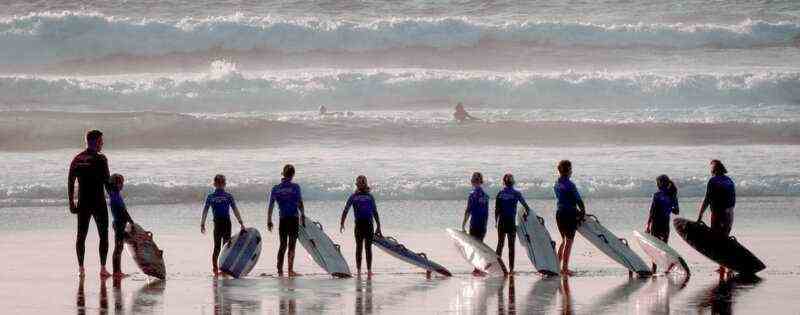A surfer on a Costa Rican beach – © Zachary Shea / Unsplash
- Surfing was originally a spiritual activity linked to the celebration of the god of fertility on different islands in the Pacific, according to our partner The Conversation.
- Today, this sport rather embodies a way of being free in a world that leaves less to less room for free will and chance.
- The analysis of this trend was carried out by Yaëlle Amsallem, doctoral student in management sciences at ESCP Business School.
The growing success of surfing is indisputable: ever more numerous competitions, ever higher waves, tourism associated with booming surfing… Some enthusiasts even brave the harshness of cold countries in order to find a wild environment. Fictions and documentaries on the subject have continued to multiply since the 1960s, and companies such as Quicksilver, Billabong or Roxy have developed their
market around surfing and the associated lifestyle.
The decision to integrate it into the 2020 Olympics in Tokyo is a definitive sign of the sport’s global success. At the heart of a
new pop culture accompanied by a ”
modern ideology of snow sports ”, The practice of surfing represents a true contemporary phenomenon.
Surfer in action © Kanenori / Pixabay
A spiritual quest
The spirit of contemplation occupies a central part in the surfing experience. “Surfing is a kind of stoic philosophy, it’s accepting that you don’t have power over things”, Sigolène Vinson tells us. In fact, the best weather applications do not predict whether it will be
possible to surf or not.
Originally, surfing was a spiritual activity deeply rooted in the religion and culture of different islands in the Pacific, especially in Hawaii where it was linked to the celebration of the God Lonos, the
god of fertility. While it was at the time reserved for high-ranking personalities, some surfers have retained this state of
spirit of osmosis with nature :
“These surfers at heart, we nickname them ‘soul surfers’. They explore the imperceptible facet of the discipline, dreaming of the precious equation between man and the element, the one that pushed Duke Kahanamoku, a pioneer of Hawaiian surfing, to soar on colossal water walls equipped with an antique acacia plank. For them, skiing is neither a vector of show off nor a series of spectacular maneuvers, but a way of life, a philosophy. They sometimes even see in it a belief akin to animism, in which the natural elements – in particular the ocean – are endowed with a vital force ”.
Reclaim his freedom
A soul surfer or free surfer directs all his life around this practice, in a society where freedom is increasingly compromised, the relationship with nature often non-existent,
increasingly strong technological alienation. This feeling of being fully present in what you are doing has become rare – except perhaps in extreme sports which allow you to achieve this type of intensity. Surfing practiced by soul surfers it is this ideal of
pioneers in search of freedom largely taken over by the American counterculture of the 1960s before it was absorbed into capitalism.
 Surf-shop on the French Atlantic coast © Dorel Gnatiuc / Unsplash
Surf-shop on the French Atlantic coast © Dorel Gnatiuc / Unsplash
Surfing represents a way of being free in a world where artificial intelligence and its algorithms leave less to less room for free will and at random. It is the apotheosis of the need to escape the system, to refocus on oneself. The craze for yoga and meditation, which have become industries that are victims of their success, is also part of the same quest for spirituality and freedom.
An antidote to almighty technology
Surfing brings a touch of poetry to the days of technological capitalism. The wave to be surfed represents the rout of artificial intelligence. To make an AI tell how to take the wave, it would have to have shown all the waves in the world and in all possible weather conditions. And even if an AI had integrated all this data, it would be failing to predict how to approach the next wave. This is what makes this moment of waiting so precious and unique: it is truly unpredictable.
In the midst of the waves, aware of his condition in the face of natural elements, the surfer observes, feels, decides and does. The indomitable ocean gives him his rightful place as a human being. Not above nature, not above the world, but far below. The promises of capitalist society come up against this impenetrable wall. This is why in the practice of surfing, something resists capitalism which sucks its criticism.
In a world where transhumanists aspire to use technologies to save humanity, even to ”
kill death », Surfing reminds man of his dizzying insignificance in the face of the unstoppable force of the ocean – and nature in general. This is why capitalism will not stop trying to absorb it, so much does it want to
ingest criticism, without ever succeeding.
Even the best surfer can find himself caught in the swell, in the middle of the ocean, unable to face the element that stands in front of him. It is also from this endangerment and this humility in the face of the elements that man derives his freedom.
A practice that resists commercial recovery
The proliferation of surf schools, magazines, competitions, films, music, surfing fashion testifies to this: the soft power surfing has never been stronger. Some business leaders even go so far as to stress the importance of “letting their employees surf,”
Yves Chouinard, founder of the Patagonia brand.
 Surf lessons at Watergate Bay (Cornwall, UK) © Nick Fewings / Unsplash
Surf lessons at Watergate Bay (Cornwall, UK) © Nick Fewings / Unsplash
Yet something resists. Capitalism cannot seize this unique and lonely moment where the surfer has to ignore everything he knows so as not to get carried away, to finally take the wave and feel a feeling of osmosis with an indomitable element and powerful.
As recalled Lodewijk Allaert :
“Those who have understood this do not care about the commercial simulacrum, the sartorial fetishism or the bad weather. They know that beyond the body, beyond thought and words, an unbreakable and primitive bond unites them to the liquid element. A kind of alchemy between man and the wave which inexorably encourages people to return to it ”.
Alternative medicine?
Surfing proves to be a particularly effective medicine for the soul in the face of increasing technoscientific drift of medicine, as the
underlines Romano :
“Objective medicine which reduces the patient to a temperature curve on a hospital bed cannot fail to give rise to a subjective, soft, natural or parallel medicine to counterbalance the dehumanization which it envelops as a methodical premise”.
While some hospitals set up secularized meditation programs in order to soothe patients suffering from chronic illnesses or depression, others have managed to use surfing for therapeutic purposes to truly heal, for example.
veterans with post-traumatic stress disorder.
 “Resurface” trailer (English version) © Netflix (Youtube)
“Resurface” trailer (English version) © Netflix (Youtube)
The ocean as an irreducible frontier
At the time of the Covid-19 pandemic, many people have
questioned their way of life –
move,
job change or
divorced.
The company says it has “become aware” of its weakness in the face of this virus, and everything is in place to fight against this pandemic. The limitation of freedoms, whether by rules imposed by the government to limit the spread of the virus such as wearing a mask, curfews, closing public places, coupled with the proliferation of applications intended to control movement of citizens, have largely affected individual freedoms.
Some even go so far as to qualify such measures ” excessive pride demonstrated by surveillance capitalism in response to the Covid-19 pandemic “. If the American counter-culture had conceived of technologies as a way of emancipating the individual from the constraints of the establishment, they are now increasingly criticized.
Surfing is perhaps likely to provide this freedom, to offer moments off the radar. According to Jérémy Lemarié:
“Surfers are often presented as conquerors who travel according to their desires, new waves to discover, fleeing the vicissitudes of modern life: […] Today, the sea is their only escape route from the overcrowding and compartmentalization of modern life. The ocean is their last frontier ”.
If in 1945 Vannevar Bush presented science to the US government as the new frontier to be conquered, it seems his wish has been granted. Technologies today promise to go beyond the limits of time – with the transhumanist ambition to kill death – and of space, with the conquest of space. From then on, the ocean may be posed as a last irreducible frontier able to
to console man in the face of modern disenchantment.
This analysis was written by Yaëlle Amsallem, doctoral student in management sciences at ESCP Business School.
The original article was published on the website of The Conversation.

Declaration of interests
Yaëlle Amsallem has received funding from ESCP Business School.

